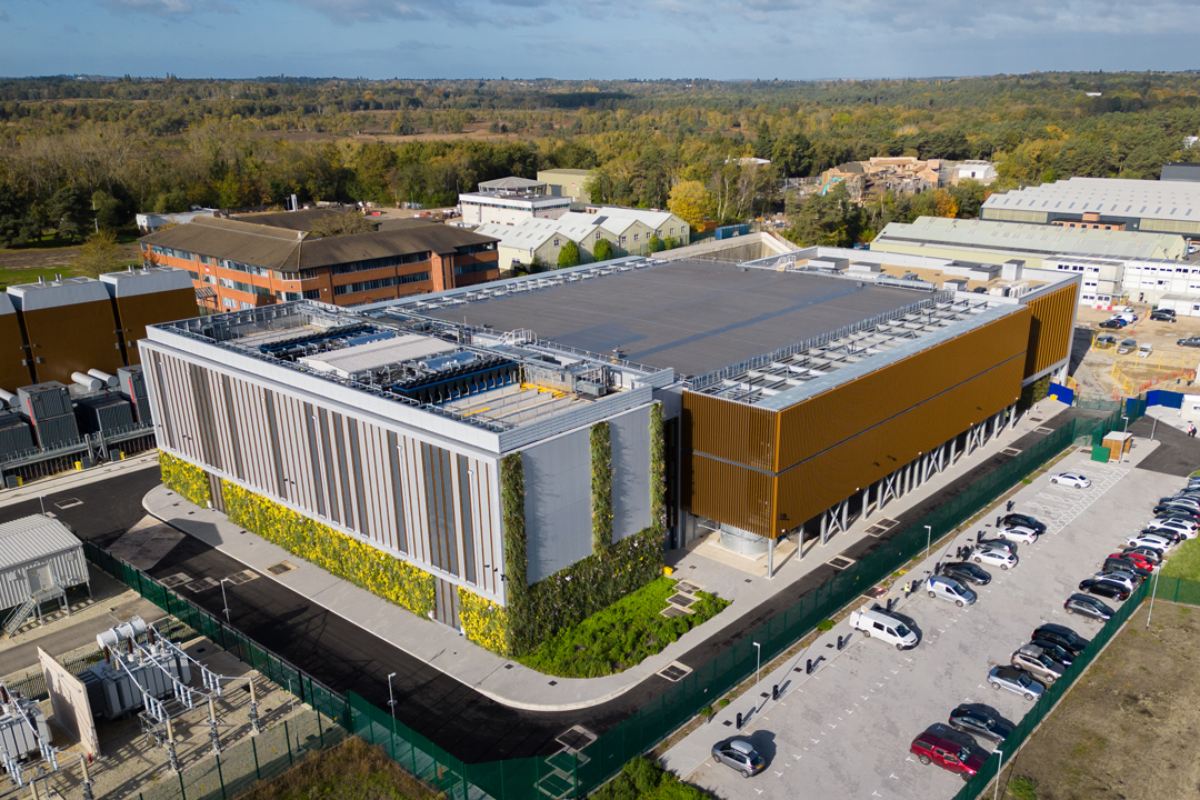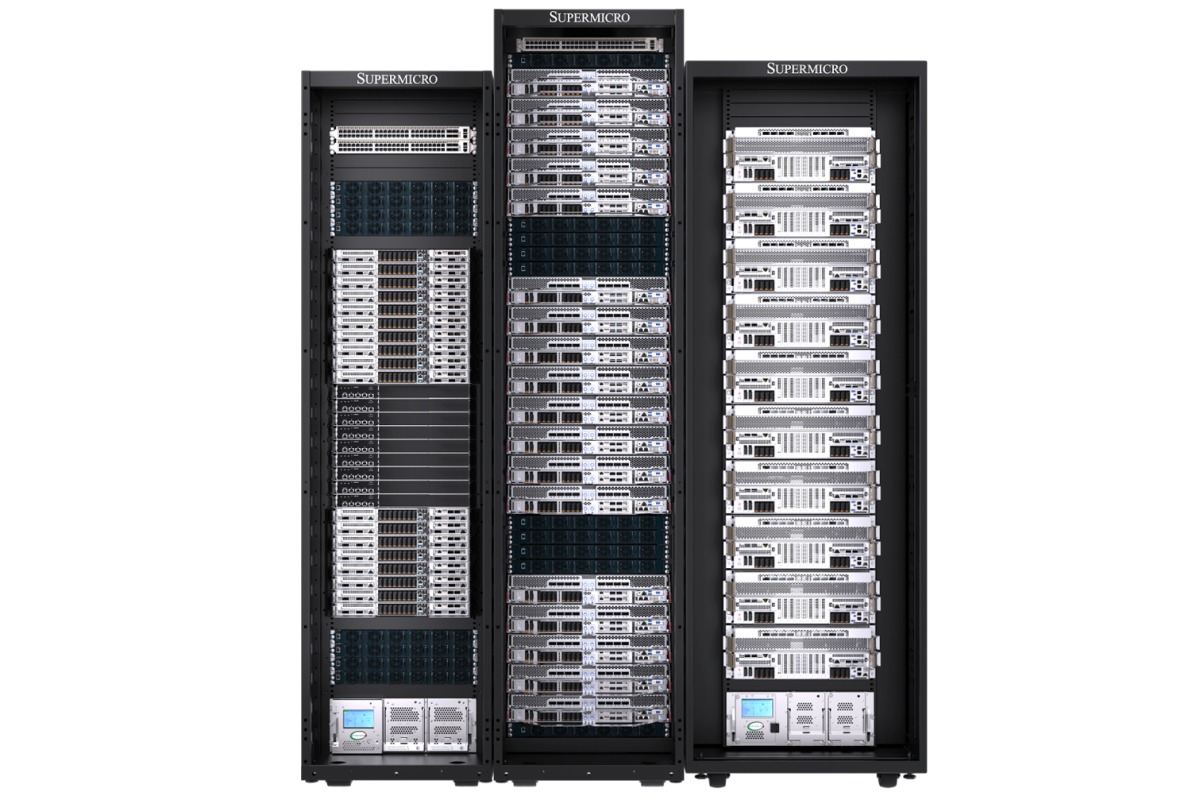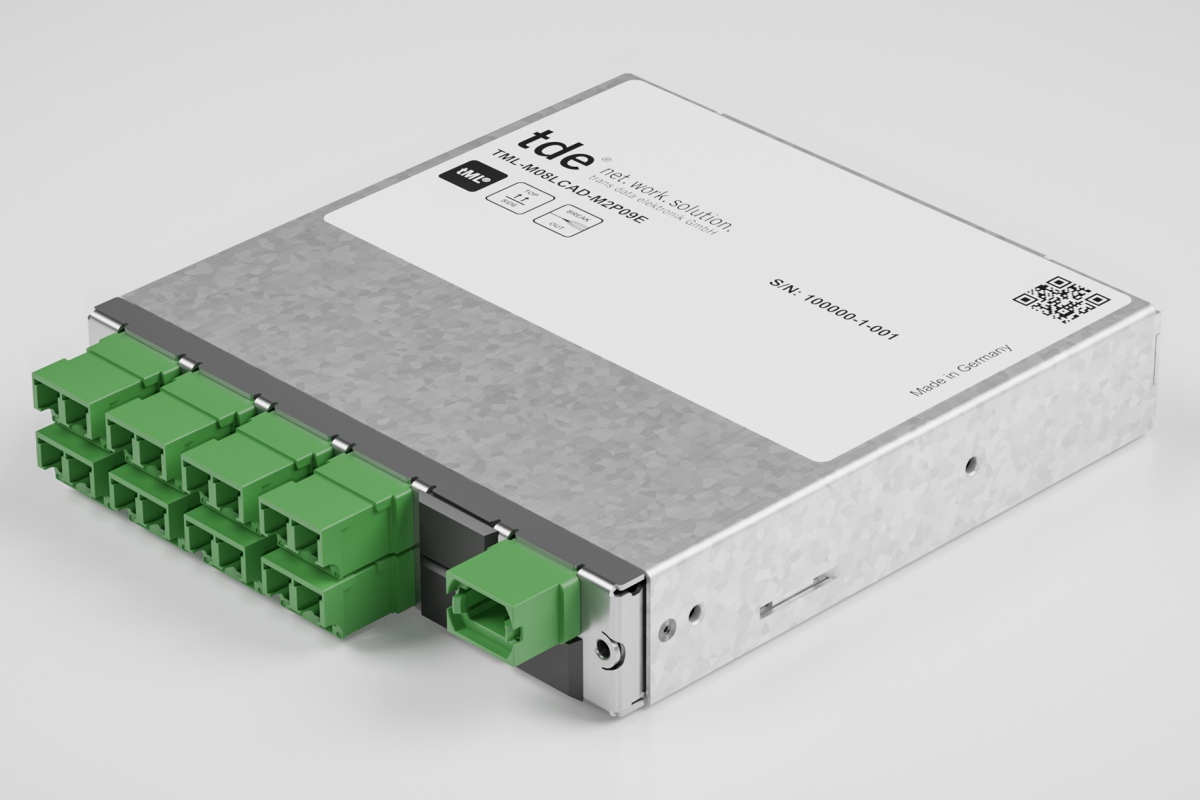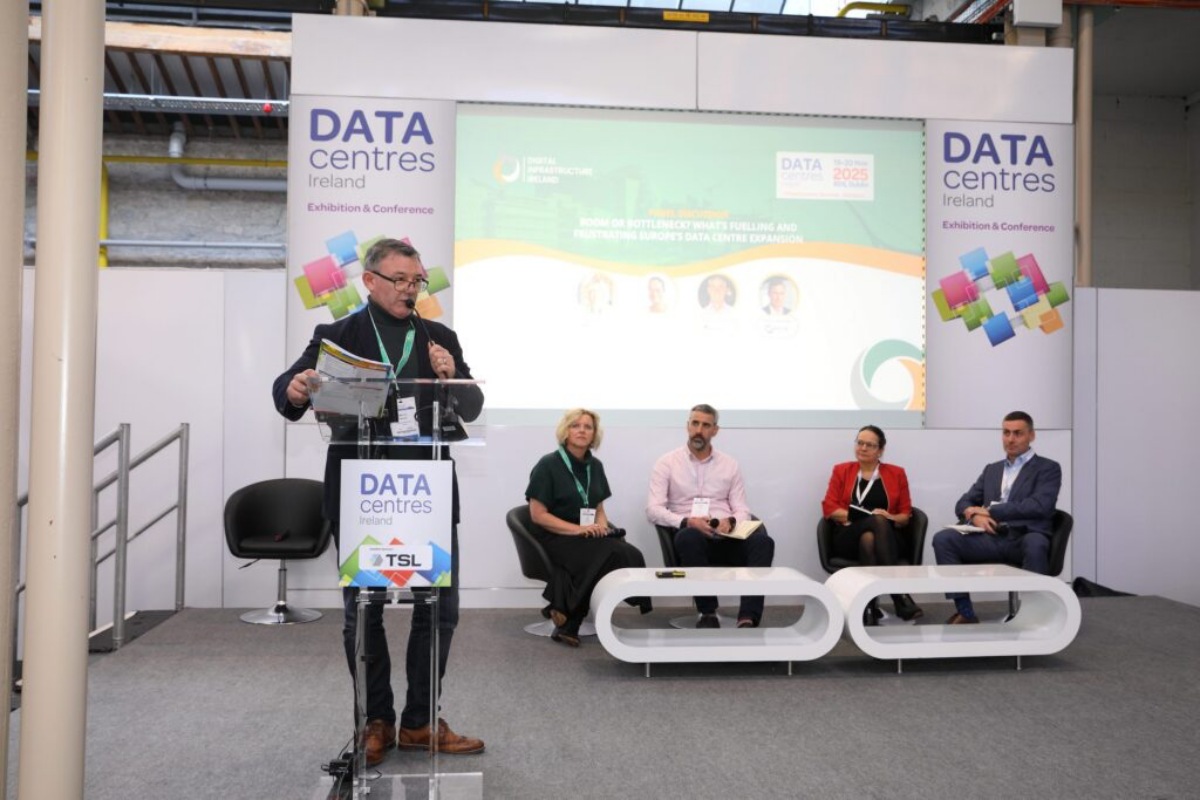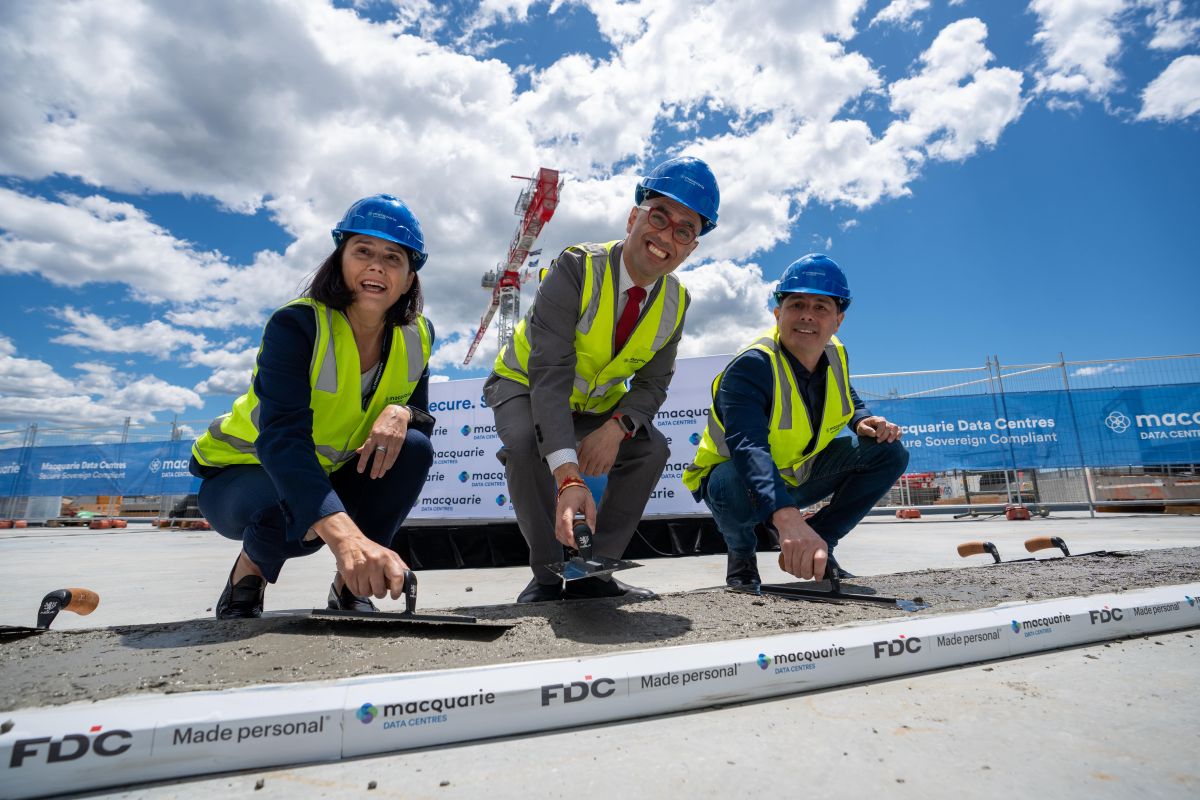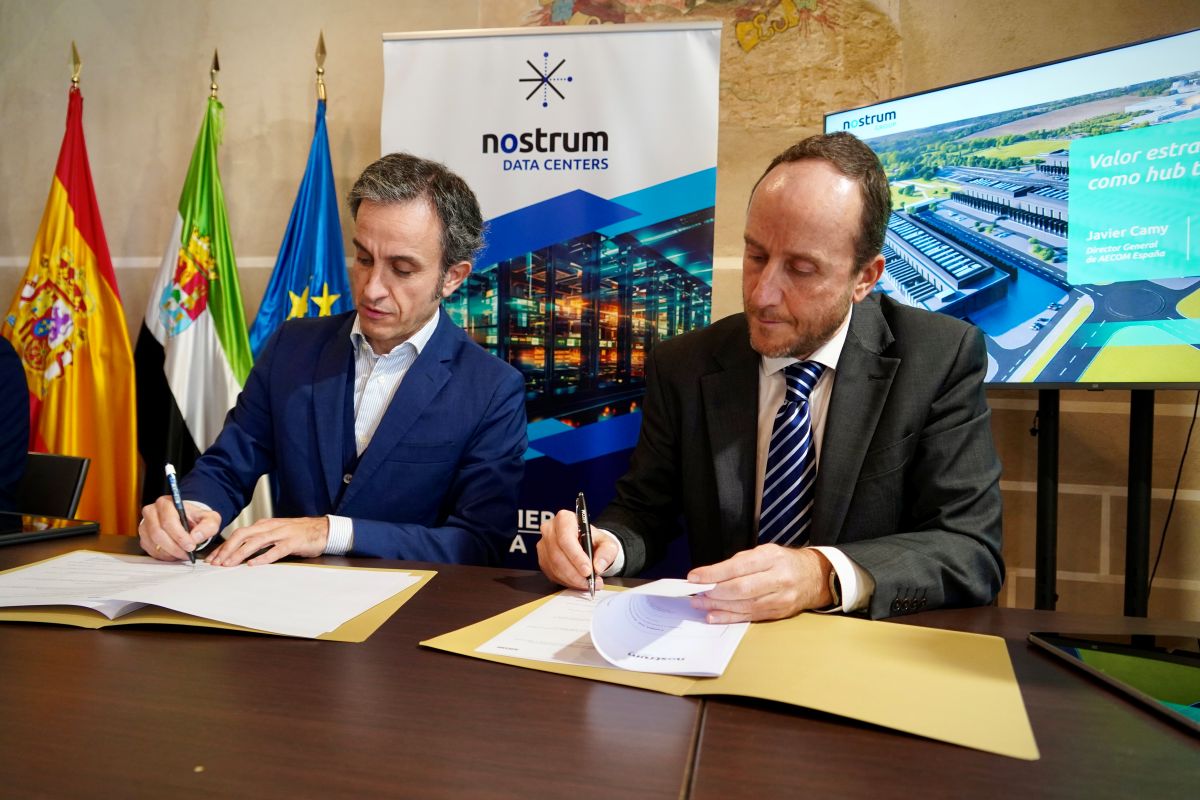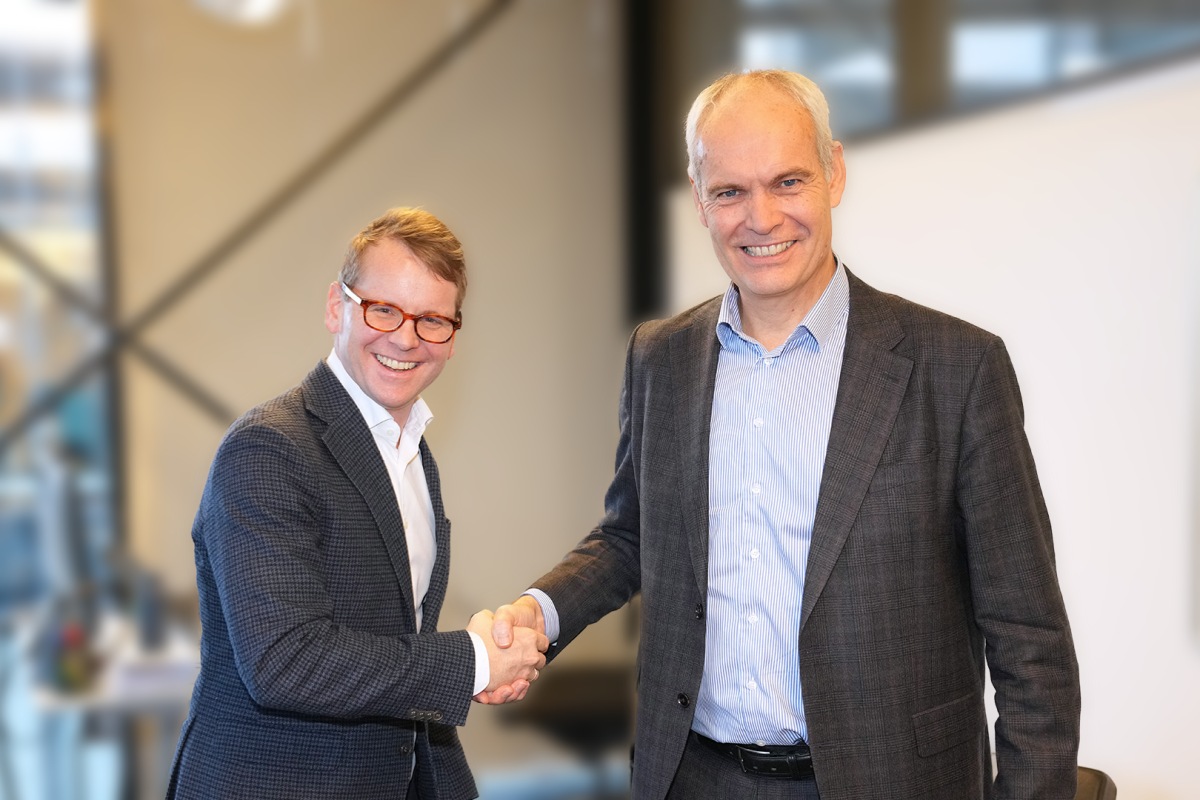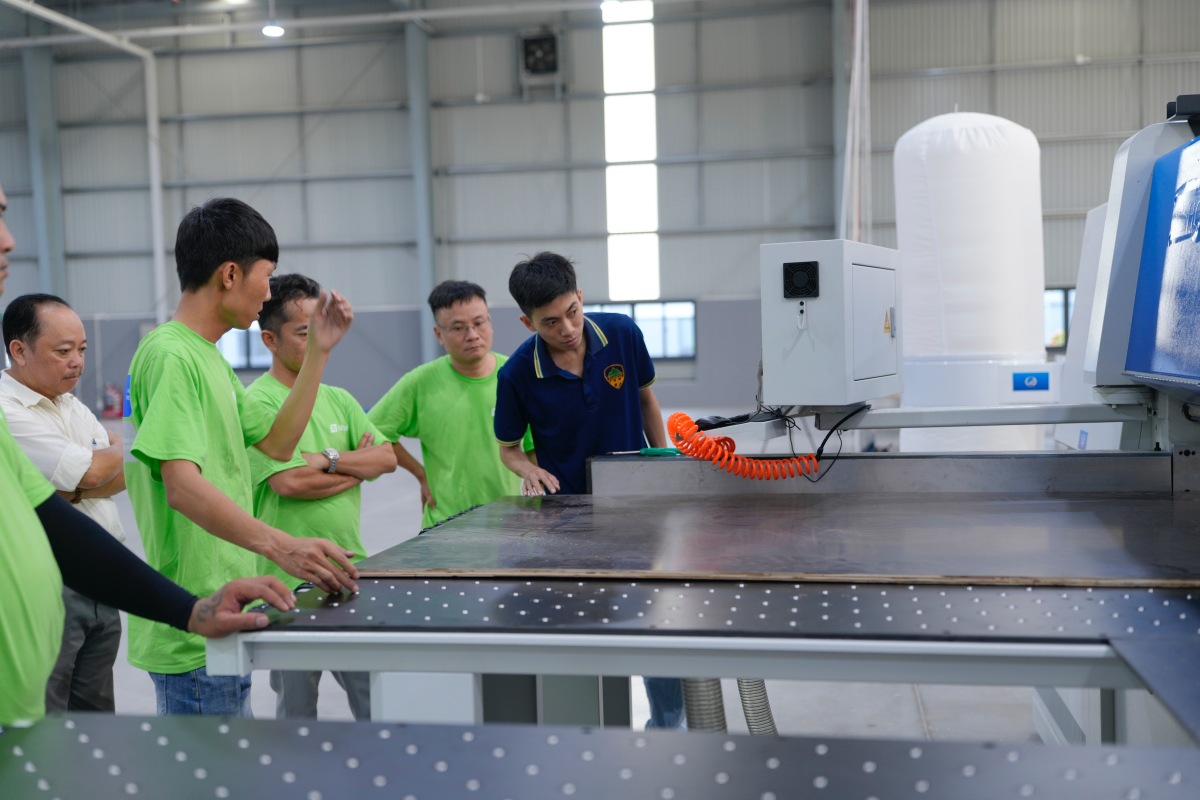News
Data Centre Infrastructure News & Trends
Innovations in Data Center Power and Cooling Solutions
News
ABB, Ark deploy medium voltage UPS in UK
ABB, a multinational corporation specialising in industrial automation and electrification products, has completed what it describes as the UK’s first deployment of a medium voltage uninterruptible power supply (UPS) system at Ark Data Centres’ Surrey campus.
The installation, with a capacity of 25MVA, is intended to support rising demand for high-density AI computing and large-scale digital workloads.
Ark Data Centres is among the early adopters of ABB’s medium voltage power architecture, which combines grid connection and UPS at the same voltage level to accommodate the growing electrical requirements of AI hardware. The project was delivered in partnership with ABB and JCA.
The installation forms part of Ark’s ongoing expansion, including electrical capacity for next-generation GPUs used in AI training and inference.
These systems support high-throughput computing across sectors such as research, healthcare, finance, media, and entertainment, and require stable, scalable power infrastructure.
Medium voltage architecture for AI workloads
Andy Garvin, Chief Operating Officer at Ark Data Centres, comments, “AI is accelerating data centre growth and intensifying the pressure to deliver capacity that is efficient, resilient, and sustainable. With ABB, we’ve delivered a first-of-its-kind solution that positions Ark to meet these challenges while supporting the UK’s digital future.”
Stephen Gibbs, UK Distribution Solutions Marketing and Sales Director at ABB Electrification, adds, “We’re helping data centres design from day one for emerging AI workloads. Our medium voltage UPS technology is AI-ready and a critical step in meeting the power demands of future high-density racks. Delivered as a single solution, we are supporting today’s latest technology and futureproofing for tomorrow’s megawatt-powered servers.
"ABB’s new medium voltage data centre architecture integrates HiPerGuard, the industry’s first solid-state medium voltage UPS, with its UniGear MV switchgear and Zenon ZEE600 control system into a single, end-to-end system. This approach eliminates interface risks and streamlines coordination across design, installation, and commissioning.”
Steve Hill, Divisional Contracts Director at JCA, says, “Delivering a project of this scale brings challenges. Having one partner responsible for the switchgear, UPS, and controls reduced complexity and helped keep the programme on track.
"Working alongside ABB, we were able to coordinate the installation and commissioning effectively so that Ark could benefit from the new system without delays or risks.”
The system reportedly provides up to 25MVA of conditioned power, achieving 98% efficiency under heavy load and freeing floor space for AI computing equipment. Stabilising power at medium voltage should also reduce generator intervention and energy losses.
For more from ABB, click here.
Joe Peck - 12 December 2025
Data Centre Infrastructure News & Trends
Enclosures, Cabinets & Racks for Data Centre Efficiency
Liquid Cooling Technologies Driving Data Centre Efficiency
Products
Supermicro launches liquid-cooled NVIDIA HGX B300 systems
Supermicro, a provider of application-optimised IT systems, has announced the expansion of its NVIDIA Blackwell architecture portfolio with new 4U and 2-OU liquid-cooled NVIDIA HGX B300 systems, now available for high-volume shipment.
The systems form part of Supermicro's Data Centre Building Block approach, delivering GPU density and power efficiency for hyperscale data centres and AI factory deployments.
Charles Liang, President and CEO of Supermicro, says, "With AI infrastructure demand accelerating globally, our new liquid-cooled NVIDIA HGX B300 systems deliver the performance density and energy efficiency that hyperscalers and AI factories need today.
"We're now offering the industry's most compact NVIDIA HGX B300 options - achieving up to 144 GPUs in a single rack - whilst reducing power consumption and cooling costs through our proven direct liquid-cooling technology."
System specifications and architecture
The 2-OU liquid-cooled NVIDIA HGX B300 system, built to the 21-inch OCP Open Rack V3 specification, enables up to 144 GPUs per rack. The rack-scale design features blind-mate manifold connections, modular GPU and CPU tray architecture, and component liquid cooling.
The system supports eight NVIDIA Blackwell Ultra GPUs at up to 1,100 watts thermal design power each. A single ORV3 rack supports up to 18 nodes with 144 GPUs total, scaling with NVIDIA Quantum-X800 InfiniBand switches and Supermicro's 1.8-megawatt in-row coolant distribution units.
The 4U Front I/O HGX B300 Liquid-Cooled System offers the same compute performance in a traditional 19-inch EIA rack form factor for large-scale AI factory deployments. The 4U system uses Supermicro's DLC-2 technology to capture up to 98% of heat generated by the system through liquid cooling.
Supermicro NVIDIA HGX B300 systems feature 2.1 terabytes of HBM3e GPU memory per system. Both the 2-OU and 4U platforms deliver performance gains at cluster level by doubling compute fabric network throughput up to 800 gigabits per second via integrated NVIDIA ConnectX-8 SuperNICs when used with NVIDIA Quantum-X800 InfiniBand or NVIDIA Spectrum-4 Ethernet.
With the DLC-2 technology stack, data centres can reportedly achieve up to 40% power savings, reduce water consumption through 45°C warm water operation, and eliminate chilled water and compressors.
Supermicro says it delivers the new systems as fully validated, tested racks before shipment.
The systems expand Supermicro's portfolio of NVIDIA Blackwell platforms, including the NVIDIA GB300 NVL72, NVIDIA HGX B200, and NVIDIA RTX PRO 6000 Blackwell Server Edition. Each system is also NVIDIA-certified.
For more from Supermicro, click here.
Joe Peck - 10 December 2025
Data Centre Infrastructure News & Trends
Enterprise Network Infrastructure: Design, Performance & Security
News
Products
tde expands tML breakout module for 800GbE ethernet
trans data elektronik (tde), a German manufacturer of fibre optic and copper cabling systems for data centres, has further developed its tML system and made it fit for increased network requirements, with the new breakout modules now supporting transceivers up to 800GbE.
QSFP, QSFP-DD, and OSFP transceivers can now be used more efficiently and split into ports with lower data rates (4 x 100GbE or 8 x 100GbE). This allows data centre and network operators to increase the port density of their switch and router chassis and make better use of existing hardware.
The company says the new breakout module is particularly suitable for use in high-speed data centres and modern telecommunications infrastructures.
“Breakout applications have become firmly established in the high-speed sector,” explains André Engel, Managing Director of tde. "With our tML breakout modules, customers can now use transceivers up to 800GbE and still split them into smaller, clearly structured port speeds.
"This allows them to combine maximum port density with very clear, structured cabling."
Efficient use of MPO-based high-speed transceivers
The current high-speed transceivers in the QSFP, QSFP-DD, and OSFP form factors have MPO connectors with 12, 16, or 24 fibres - in multimode (MM) or single-mode (SM).
Typical applications such as SR4, DR4, and FR4 use eight fibres of the 12-fibre MPO, while SR8, DR8, and FR8 use sixteen fibres of a 16- or 24-fibre MPO.
This is where tde says it comes in with its tML breakout modules. Depending on the application, the modules split the incoming transmission rate into, for example, four 100GbE or eight 100GbE channels with LC duplex connections.
This allows multiple dedicated links with lower data rates to be provided from a single high-speed port - for switches, routers, or storage systems, for example.
Alternatively, special versions with other connector faces such as MDC, SN, SC, or E2000 are available.
Front MPO connectors and maximum packing density
tde also relies on front-integrated MPO connectors for the latest generation of tML breakout modules. The MPO connections are plugged in directly from the front via patch cables.
Compared to conventional solutions with rear MPO connectors, this aims to simplify structured patching, ensure clarity in the rack, and facilitate moves, adds, and changes during operation.
A high port density can be achieved without the need for separate fanout cables. Eight tML breakout modules can be installed in the tML module carrier with one height unit.
Future-proofing and investment protection
tde says it has designed the tML breakout module for maximum ease of use. It can only be patched in the front patch panel level, seeking to support structured and clear cabling.
Since the tML module carrier can be mixed and matched depending on the desired application and requirements, the breakout module should offer high packing density. Fibre-optic and copper modules can also be combined.
André concludes, “With the addition of the tML breakout module, our tML system platform is well equipped for the future and will remain competitive in the long term.”
Joe Peck - 9 December 2025
Data Centre Infrastructure News & Trends
Enterprise Network Infrastructure: Design, Performance & Security
News
Energy Estate unveils Tasmanian subsea cables and hubs
Energy Estate Digital, a digital infrastructure platform backed by Energy Estate, has set out plans for new data centre hubs and subsea connectivity in Tasmania as part of a wider programme to support the growth of artificial intelligence infrastructure across Australia, New Zealand, and key international markets.
The company is developing subsea cable routes between Australia and New Zealand, as well as major global hubs including California, Japan, and India.
These new links are intended to support the expanding AI sector by connecting regions that offer land availability, renewable energy potential, and access to water resources.
The platform, launched in December 2024, aligns with national objectives under the Australian National AI Plan announced recently by the Federal Government.
As part of its approach to sovereign capability, the company says it intends to offer “golden shares” to councils and economic development agencies in landing-point regions.
Two proposed subsea cable landings in Tasmania will form part of the network: the CaliNewy route from California will come ashore at Bell Bay, while the IndoMaris route from Oman and India will land near Burnie.
These proposed locations are designed to complement existing cable links between Victoria and Tasmania and future upgrades anticipated through the Marinus Link project.
Large-scale energy and infrastructure precincts are expected to develop around these landings, hosting AI facilities, data centre campuses, and other power-intensive industries such as manufacturing, renewable fuels production, and electrified transport.
These precincts will be supported by renewable energy and storage projects delivered by Energy Estate and its partners.
Partnership to develop industrial and digital precincts
Energy Estate has signed a memorandum of understanding with H2U Group to co-develop energy and infrastructure precincts in Tasmania, beginning with the Bell Bay port and wider industrial area.
In 2025, H2U signed a similar agreement with TasPorts to explore a large-scale green hydrogen and ammonia facility within the port.
Bell Bay has been identified by the Tasmanian Government and the Australian Federal Government as a strategic location for industrial development, particularly for hydrogen and green manufacturing projects.
Energy Estate and H2U plan to produce a masterplan that builds on existing infrastructure, access to renewable energy, and the region’s established industrial expertise. The work will also align with ongoing efforts within the Bell Bay Advanced Manufacturing Zone.
The digital infrastructure hub proposed for Bell Bay will be the first of three locations Energy Estate intends to develop in Northern Tasmania. The company states that the scale of interest reflects Tasmania’s emerging position as a potential global centre for AI-related activity.
Beyond Tasmania, Energy Estate is advancing similar developments in other regions, including the Hunter in New South Wales; Bass Coast and Portland in Victoria; Waikato, Manawatu, and South Canterbury in New Zealand; and the Central Valley in California.
Joe Peck - 9 December 2025
Artificial Intelligence in Data Centre Operations
Data Centre Operations: Optimising Infrastructure for Performance and Reliability
News
Study finds consumer GPUs can cut AI inference costs
A peer-reviewed study has found that consumer-grade GPUs, including Nvidia’s RTX 4090, can significantly reduce the cost of running large language model (LLM) inference.
The research, published by io.net - a US developer of decentralised GPU cloud infrastructure - and accepted for the 6th International Artificial Intelligence and Blockchain Conference (AIBC 2025), provides the first open benchmarks of heterogeneous GPU clusters deployed on the company’s decentralised cloud platform.
The paper, Idle Consumer GPUs as a Complement to Enterprise Hardware for LLM Inference, reports that clusters built from RTX 4090 GPUs can deliver between 62% and 78% of the throughput of enterprise-grade H100 hardware at roughly half the cost.
For batch processing or latency-tolerant workloads, token costs fell by up to 75%.
The study also notes that, while H100 GPUs remain more energy efficient on a per-token basis, extending the life of existing consumer hardware and using renewable-rich grids can reduce overall emissions.
Aline Almeida, Head of Research at IOG Foundation and lead author of the study, says, “Our findings demonstrate that hybrid routing across enterprise and consumer GPUs offers a pragmatic balance between performance, cost, and sustainability.
"Rather than a binary choice, heterogeneous infrastructure allows organisations to optimise for their specific latency and budget requirements while reducing carbon impact.”
Implications for LLM development and deployment
The research outlines how AI developers and MLOps teams can use mixed hardware clusters to improve cost-efficiency.
Enterprise GPUs can support real-time applications, while consumer GPUs can be deployed for batch tasks, development, overflow capacity, and workloads with higher latency tolerance.
Under these conditions, the study reports that organisations can achieve near-H100 performance with substantially lower operating costs.
Gaurav Sharma, CEO of io.net, comments, “This peer-reviewed analysis validates the core thesis behind io.net: that the future of compute will be distributed, heterogeneous, and accessible.
"By harnessing both data-centre-grade and consumer hardware, we can democratise access to advanced AI infrastructure while making it more sustainable.”
The company also argues that the study supports its position that decentralised networks can expand global compute capacity by making distributed GPU resources available to developers through a single, programmable platform.
Key findings include:
• Cost-performance ratios — Clusters of four RTX 4090 GPUs delivered 62% to 78% of H100 throughput at around half the operational cost, achieving the lowest cost per million tokens ($0.111–0.149).
• Latency profiles — H100 hardware maintained sub-55ms P99 time-to-first-token even at higher loads, while consumer GPU clusters were suited to workloads tolerating 200–500ms tail latencies, such as research, development environments, batch jobs, embeddings, and evaluation tasks.
Joe Peck - 4 December 2025
Data Centres
Events
News
A round-up of DataCentres Ireland 2025
DataCentres Ireland was again heralded as a success by the exhibitors, alongside many of the visitors and speakers, as it delivered more attendees, more content, and more delegates than ever before.
The total attendance was up 23.0% YoY over the two days of the event, delivering to over 3000 people interested in the sector.
Louisa Cilenti, Chief Legal Officer at Clear Decisions, notes, “DataCentres Ireland was an outstanding forum to get underneath the strategic issues shaping Ireland’s future as a global data centre hub.
"From Minister Dooley’s address to the highly practical breakout sessions, the day struck the perfect balance between policy depth and real-world innovation.
"The relaxed venue made meaningful networking effortless and, as a startup, Clear Decisions really valued the genuine peer environment. A fantastic event that brings the whole ecosystem into one conversation.”
Day 1 was busy from the outset. Starting with a keynote address from Minister of State Timmy Dooley TD detailing the Irish Government recognising the essential nature of data centres in modern society and its wish to work with the data centre community both for the leveraging of AI as well as recognising the impact of data centres in attracting foreign direct investment.
Day 1 saw a massive 34.7% growth on attendance YoY, with exhibitors and attendees commenting on the buzz in the exhibition hall.
Day 2 had a slower start, though footfall built with a good feeling in the hall. The event delivered over 600 new individuals for exhibitors to network and do business with, which were similar numbers to those achieved on Day 2 in 2024.
This was the largest visitor and total attendance in the event's 15-year history, delivering over 3000 attendees across the two days.
The number of exhibitors also grew, with the exhibition featuring over 140 individual stands and showcasing more than 180 companies and thousands of brands.
An event of opportunities
Exhibitors and attendees acknowledged that DataCentres Ireland provided a professional business environment where people were able to network with colleagues; see the latest in products, services, technology, and equipment; and listen to industry leaders and experts discussing the latest issues, approaches, and ideas affecting data centres and critical environments.
Paul Flanagan, EMEA Regional Director West, Camfil, comments, “As usual, a well-organised event by Stepex. Great variety of exhibitors and visitors, so plenty of networking opportunities along with being able to see all the latest and greatest technologies and services available on the market today.
"The data centre segment is getting smarter and more collaborative, and this event guarantees any visitor the opportunity to appreciate that in many ways.
Exhibitors commented on the quality of attendees present at DataCentres Ireland and lack of 'time wasters' at the show, giving them more time to engage with buyers, discuss their needs, and forge lasting business contacts and relationships.
The conference programme featured 90 international and local experts and industry leaders. The conference addressed a wide range of issues from data centre development, regionalisation, training and staff retention, the impact of AI on data centres, as well as decarbonisation, energy reduction, and heat re-use.
One of the many highlights was an insightful presentation by Mark Foley, CEO of Mark Foley Strategic Solutions, on the state of the Irish grid network and what could be actioned to make this grid more flexible for data centres. All presentations were broadly supportive of data centres and their continued development in Ireland.
Mark comments, “An excellent conference at a challenging time for the sector in Ireland. The key issues were discussed and practical and innovative solutions are now emerging if Government and regulators make the right decisions.”
For more from DataCentres Ireland, click here.
Joe Peck - 3 December 2025
Data Centre Build News & Insights
Data Centre Projects: Infrastructure Builds, Innovations & Updates
News
Macquarie tops out $350M, 47MW AI data centre
The New South Wales Treasurer, Hon. Daniel Mookhey MP, today poured the final concrete on Macquarie Data Centres’ newest 47 megawatt (MW) facility, IC3 Super West. The ceremony marks the completion of the building’s external structure and a major milestone toward its scheduled opening in September 2026.
IC3 Super West will be the only data centre to add new AI capacity to Sydney’s north zone in 2026, Macquarie states. With all the end-state power already secured, the facility is being purpose-built to meet the growing demands from hyperscalers, enterprise and neoclouds for GPU and high-performance computing capacity in the Tier 1 hub. The facility is part of Macquarie Data Centres’ 200MW development pipeline adding more AI and cloud capacity to the market.
NSW Treasurer, Hon. Daniel Mookhey MP, says, “Companies like Macquarie Data Centres keep investing, keep expanding, and keep believing that NSW can be a global home for high-tech infrastructure. And it happens because the government has chosen to take planning and investment delivery seriously.
“In the years ahead, thousands of businesses will run smarter because this building exists. Research will accelerate because this building exists. AI capability will expand because this building exists. And NSW will be more competitive – globally competitive – because this building exists.”
Sydney is seeking to cement its position as a leading hub for AI, cloud and digital innovation, supported by new initiatives such as the NSW Government’s new Investment Delivery Authority - which aims to accelerate future technology infrastructure projects like Macquarie Data Centres’ recently announced 150MW planned site.
Macquarie Data Centres Group Executive, David Hirst, comments, “IC3 Super West is the next data centre in our pipeline of sites planned to add circa 200MW of AI and cloud capacity in Sydney. Demand for high-density AI infrastructure is the most significant megatrend we’ve seen in over 25 years in the data centre industry. IC3 Super West, opening in Q3 2026, is purpose-built for the high-density power and liquid cooling demands of new AI technology. Sovereign data centres keep Australia competitive in the global market and are the foundation of our AI future.”
IC3 Super West is the third facility to be built at the leading provider’s 65MW Macquarie Park Data Centre Campus in Sydney’s north zone and is designed to support a hybrid mix of air and liquid cooling for direct-to-chip, high-density AI and cloud workloads. Phase 1 of the build is a circa $350 million investment and will deliver the complete core and shell with 6MW IT load fitted out.
For more from Macquarie, click here.
Simon Rowley - 2 December 2025
Data Centre Build News & Insights
News
AECOM appointed to deliver data centre in Spain
AECOM, a global infrastructure specialist, today announced it has been selected by Nostrum Data Centers (an affiliate of Nostrum Group) to lead the design and construction management of a new data centre in Badajoz, Spain. With an investment exceeding €1.9 billion, ‘Nostrum Evergreen’ is reportedly one of Spain’s most ambitious digital infrastructures projects, with capacity expected to reach 500 megawatts, supporting the rapid growth of AI across Europe.
The first phase includes the design and construction of data halls and the critical operational infrastructure, with an initial capacity of 150 million watts of electric capacity (MWe). The second phase, which will allow the site to reach 300 MWe, is scheduled to begin in early 2029. The complex’s design will enable scalability up to 500 MWe, making it one of the most ambitious facilities in southern Europe. A ‘next-generation’ campus, Nostrum Evergreen will also integrate advanced cooling systems and intelligent power consumption management.
"This data centre in Badajoz will have a total capacity similar to the combined capacity of all current operational data centres in Spain,” says Gabriel Nebreda, CEO of Nostrum Group. “Furthermore, we have set ourselves a very demanding deadline to start construction of this mega campus next year. Achieving this ambition is only possible through strategic partnerships with leading global players in the data centre sector. We are very pleased to announce this agreement with AECOM, one of the most prestigious engineering firms, who have extensive experience in AI gigafactories worldwide."
"We are delighted to collaborate with Nostrum Group on this project, which will become an international benchmark in data centres,” adds Javier Camy, Managing Director, Spain, AECOM. “At AECOM, we leverage our global capability in highly complex technical projects and our strong position in the sector to apply a transformative approach that ensures a sustainable, forward-thinking solution. This partnership reflects our ability to co-lead initiatives that redefine regions and enhance the global competitiveness of our clients."
“This is very positive news for the city and for the region as a whole. It represents a decisive opportunity for the development of Badajoz and highlights the dedication and strong commitment to our city, something we deeply value and appreciate,” notes Ignacio Gragera, Mayor of Badajoz.
The project, which expects to obtain its building permit by mid-2026, has already secured electrical capacity, without relying on the future Spanish Electrical Grid Development Plan 2025–2030. In addition, it boasts more than 200,000 square metres of ready-to-build industrial land in one of the region’s most advanced industrial parks. The site aims to position the Extremadura region as an emerging hub in the European data centre ecosystem.
For more from AECOM, click here.
Simon Rowley - 1 December 2025
Data Centre Build News & Insights
News
Sustainable Infrastructure: Building Resilient, Low-Carbon Projects
atNorth's DEN01 to supply district heating in Copenhagen
atNorth, an Icelandic operator of sustainable Nordic data centres, has agreed a partnership with Vestforbrænding, Denmark’s largest waste-to-energy company, to supply excess heat from its forthcoming DEN01 data centre campus into the district heating network serving Greater Copenhagen.
DEN01, a 22.5MW site in Ballerup, is scheduled to open in early 2026. Through the collaboration, warm water generated as a by-product of direct liquid cooling will be transferred into Vestforbrænding’s network from 2028.
The recovered heat is expected to support the heating of more than 8,000 homes, reducing energy consumption for local central heating and lowering emissions for both organisations.
Denmark has pursued decarbonisation for several years and has set a national target to become net zero by 2045, with a 110% emissions reduction target by 2050. Coal is being phased out of the district heating sector, and heat-reuse projects form part of the country’s circular economy strategy.
atNorth highlights that the initiative aligns with its wider approach to sustainable construction, energy efficiency, and community-focused development.
Vestforbrænding is expanding its network as part of its 2030 District Heating Plan, replacing oil and gas boilers across thousands of households and integrating new heat sources such as surplus heat from data centres.
Heat-reuse initiatives across the Nordics
Steen Neuchs Vedel, CEO of Vestforbrænding, says, “For many years, we have talked about surplus heat from data centres being part of the future. Now, the future is here.
“With today’s contract signing, we are showing the way forward for how surplus heat from data centres can reach people’s homes. There has also been talk about sector coupling in the district heating sector: today, we demonstrate how this can happen in practice, to the benefit of consumers.”
Eyjólfur Magnús Kristinsson, CEO at atNorth, adds, “As the demand for AI-ready digital infrastructure continues to increase, it is imperative that data centre companies scale in a responsible way.
“By actively seeking heat-reuse partnerships for our data centres, we can mitigate our environmental impact, benefit the communities in which we operate, and help clients decarbonise their IT workloads.”
The announcement follows atNorth’s partnership with Wa3rm, which plans to use waste heat from the company’s DEN02 site to support local vegetable production.
atNorth has also agreed a heat-reuse initiative with Kesko Corporation to supply recovered heat from its FIN02 site to a neighbouring store.
For more from atNorth, click here.
Joe Peck - 1 December 2025
Data Centre Build News & Insights
Data Centre Projects: Infrastructure Builds, Innovations & Updates
News
Subzero Engineering opens new Vietnam facility
Subzero Engineering, a provider of data centre containment systems, has expanded its global operations with a new facility in Ho Chi Minh City, strengthening its position in the Asia-Pacific market and supporting growing regional demand for data centre infrastructure.
The site will act as a central hub for APAC activities, reinforcing the company’s long-term presence in the region and improving proximity to partners and supply chains.
Midge Pan, General Manager, APAC, Subzero Engineering, comments, “This expansion is about more than infrastructure; it’s about proximity to our partners, agility in the supply chain, and speed to market.
“Vietnam offers a unique combination of talent, resilience, and strategic location that enables us to meet APAC’s growing demand for cutting-edge digital infrastructure.”
'Centre of excellence' for design and manufacturing
The Ho Chi Minh City facility will serve as a "centre of excellence" supporting global engineering teams. It will accommodate manufacturing, design, and research and development functions, and will produce Subzero’s containment systems, modular enclosures, aisle frames, and airflow management equipment.
Dedicated research and development space will also support the creation of technologies tailored to APAC’s fast-changing data centre market, including approaches aimed at AI, high-density computing, and sustainability.
Shane Kilfoil, President of Subzero Engineering, explains, “This new facility is a strategic cornerstone in Subzero’s global vision, designed to integrate localised innovation with global scale.
“By establishing a centre of excellence in Vietnam, we’re not just expanding our footprint; we’re embedding agility, resilience, and sustainability into the core of our operations.”
The company expects the site to create more than 50 skilled roles across engineering and technical disciplines. Subzero also plans to form partnerships with local universities and technical institutions to support training and internship programmes.
The facility has been developed within a building designed with sustainability features, including on-site solar generation, energy-efficient systems, and low-carbon construction methods.
Subzero says these measures reflect its wider environmental commitments and its focus on reducing operational impact.
With established operations across North America and Europe, the addition of the Vietnam site aims to strengthen the company’s global network. It also allows Subzero to offer more responsive support to regional customers as demand for new data centre capacity increases.
For more from Subzero Engineering, click here.
Joe Peck - 28 November 2025

Head office & Accounts:
Suite 14, 6-8 Revenge Road, Lordswood
Kent ME5 8UD
T: +44 (0)1634 673163
F: +44 (0)1634 673173
